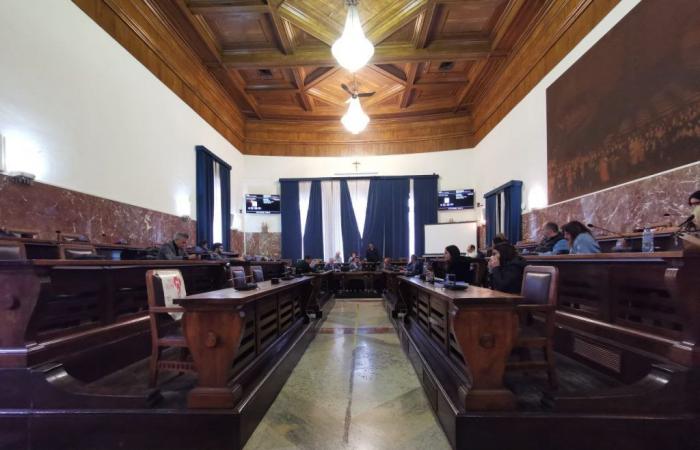MESSINA – The City Council voted in favor of a motion with which it officially took a stand against the differentiated autonomy, which became law at the end of June. Of the 28 present, 18 voted yes to the resolution proposed by the Democratic Party. Six voted no. These were Villari, Restuccia, Centofanti, D’Arrigo and Rotondo, all from the Lega/Prima L’Italia group, and Carbone, the only member of Fratelli d’Italia present in the chamber (both Currò and Gioveni were absent for personal reasons). Four abstained: Cantello, now president in place of Pergolizzi, and the three from the mixed group Buonocuore, Di Ciuccio and Oteri. The vote in favor was expressed by the Democratic Party, the groups linked to Basile and De Luca and Ora Sicilia.
Basile: “It doesn’t take into account the needs of the territory”
The mayor Federico Basile opened the proceedings, accompanied in the chamber by councilor Pietro Currò. The mayor wanted to express the position of the administration on a topic that “is not part of those reforms that have taken into account the needs of the territories, but above all of those territories of the South that do not need a law that determines the methods of implementing decentralization but a different institutional respect”. Basile focused on the “short blanket that moves but is always short”, without focusing on one aspect or another, but leaving room for debate in the Council. First, however, he underlined “the need for reforms to be shared with the territory. The governor of Sicily, unlike that of Calabria, applauded the reform”. And again: “If autonomy is needed, it must be true autonomy”. Finally: “The prospect that the reform will erase that principle of democracy that should exist is tangible”.
Russo: “Messina must express itself”
Then Alessandro Russo, who illustrated the resolution as the first signatory: “This chamber expressed itself already in April 2023 on the effects of differentiated autonomy and expressed a favorable opinion on another resolution presented by the Democratic Party on the potential risks of this law. That vote, largely majority in this chamber, today has a phase 2 because as you know on June 28 that bill became law 86 of 2024, published in the Official Journal. It introduces regional differentiated autonomy. I recall what the mayor said: there is a blanket problem. This new law does nothing other than, to put it simply, introduce for the regions that want to request it further forms of autonomy to be able to decide in 23 delegations ranging from health, to education, to foreign trade, and so on. The Regions can legislate and have resources autonomously even with respect to the central government. What would happen if the Regions legislated autonomously with respect to schools? But also on what to invest in, on what tools for schools, or even worse if everyone could decide who can teach in schools, from nursery school to high school”.
His speech was very long and detailed, lasting over 20 minutes, in which he spoke about the equalization tools, about the poor regions penalized compared to the rich ones, and also referring to the words of Occhiuto, the president of the Calabria region, of Forza Italia, who criticized the reform. Russo then concluded: “The municipal council of the thirteenth largest city in Italy must absolutely oppose in form a plan that sees this territory impoverished, compromising essential services and our very future. The agenda includes expressing a position of disapproval with respect to law 86 of 2024″, but also “concern” for the law itself. And the resolution also plans to “commit the administration” to express the motion as a political expression of the Messina community.
Centofanti in defense of the government
Russo was supported first by Salvatore Papa from South calls North, then by his PD colleague Antonella Russo and Raimondo Mortelliti of Con De Luca for Basile. The position of the groups linked to the mayor is clear, and already in the debate they expressed their opposition to differentiated autonomy (and shortly afterwards the group leader Francesco Cipolla di Basile mayor also intervened in this sense). Cettina Buonocuore also spoke and underlined that “I don’t think the government can think of abandoning a part of Italy”.
Amalia Centofanti, who acted as spokesperson for the Lega and Prima l’Italia groups, took a different position with a speech lasting a few minutes in which she defended the national government and the choice to make differentiated autonomy law. Centofanti responded to those who spoke of a law “that divides the country”, explaining that “priority will be given to determining the essential levels of performance concerning civil and social rights that must necessarily be guaranteed throughout the national territory. And there will be a guarantee that these rights will be guaranteed to all citizens, everywhere. According to the implementation plan, those who do not request autonomy will not be deducted a single euro. I have heard other attacks according to which it is said that autonomy cannot be achieved without the prior determination of the essential levels of performance”. He then continued by reiterating the various guarantees given by the government and some “clarifications” with which he expressed “the will to ask colleagues, beyond purely political ideas, not to create alarmism or difficulties, but to work so that the Regions that decide to conclude such agreements can work in the best possible way and in the interest of citizens”.



